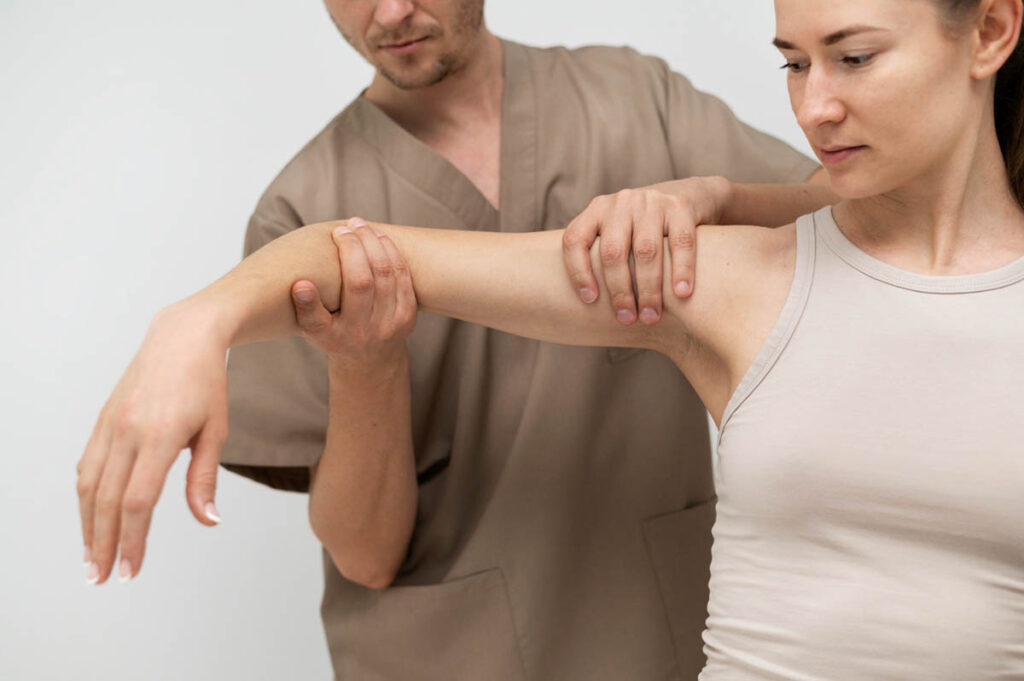So you’ve made it through rotator cuff surgery—congrats, that’s no small feat. But here’s the thing most people don’t realize: surgery is just the beginning. The real battle starts afterward with rehab and physical therapy. Whether you’re an athlete trying to get back in the game or someone who just wants to lift a coffee mug without wincing, physical therapy after rotator cuff surgery is the key to a full, functional recovery.
At Total Health and Rehab, we work with patients every day who are surprised by how much effort the post-op journey requires. But with the right plan, the right timeline, and the right team, that shoulder can heal stronger than ever. Let’s break it all down.
Understanding the Rotator Cuff – And Why It’s So Prone to Injury
Before we dive into rehab strategies, it helps to know what we’re dealing with. The rotator cuff is a group of four small muscles and tendons that stabilize your shoulder joint and allow you to lift and rotate your arm. It’s a delicate but critical structure—kind of like the engine parts that keep your car running smoothly.
When these tendons get torn (whether partially or completely), it can seriously affect your range of motion, strength, and comfort. And even after surgical repair, the tissue needs time to heal and retrain, especially if you want to avoid re-injury.
Why Surgery Isn’t the Finish Line
You might think the hard part is over once the tear is stitched up, but here’s the truth: Without targeted, progressive physical therapy, you run a high risk of stiffness, scar tissue buildup, or worse—re-tearing the repair. That’s why your rehab plan matters just as much as your surgeon’s technique.
Common Reasons You Might Need Rotator Cuff Surgery
Rotator cuff injuries don’t just happen to baseball pitchers or weightlifters. The causes vary, but here are the most common ones we see:
1. Acute Injuries
A sudden fall, heavy lifting, or a jerking motion can cause the tendon to tear. These are the “I knew the second it happened” types.
2. Degenerative Tears
These sneak up over time, often due to repetitive overhead movement or just the wear and tear of aging. Most people don’t even realize they’re dealing with a tear until the pain or weakness becomes impossible to ignore.
3. Poor Posture & Imbalance
Slouched posture and imbalanced muscles can overload the shoulder joint, increasing risk of damage.
4. Inflammatory Conditions
Issues like bursitis or tendonitis can lead to chronic inflammation and eventual tearing of the cuff.
5. Nerve Impingement or Referred Pain
In some cases, nerve issues in the neck or upper back can mimic or worsen shoulder conditions, making accurate diagnosis essential.
What to Expect After Surgery
Most rotator cuff surgeries today are done arthroscopically, which is less invasive and offers faster recovery. But don’t let the small incisions fool you—the healing process still takes months.
Typically, your surgeon will recommend physical therapy starting anywhere from a few days to 6 weeks post-op, depending on the size of the tear and your overall health.
Your Physical Therapy Roadmap – Step by Step
Here’s what you can expect during rehabilitation after rotator cuff surgery, broken down into phases:
1. Passive Motion Phase (0–6 weeks)
At this stage, your shoulder is still healing and you’ll avoid using your muscles actively. A physical therapist will gently move your arm through a specific range to prevent stiffness and protect the repair.
We focus on:
- Pain management
- Reducing swelling
- Maintaining joint mobility
2. Active Motion Phase (6–12 weeks)
Now your therapist will guide you through light, controlled movements you perform on your own. We start reintroducing shoulder motion without resistance.
Goals here include:
- Regaining full range of motion
- Preventing scar tissue
- Promoting circulation to help healing
3. Strengthening Phase (12–20 weeks)
This is where we begin to add resistance exercises, carefully. Every move is targeted to strengthen the rotator cuff without overloading the tendon.
What we work on:
- Shoulder blade stability
- Rotator cuff and deltoid muscle strength
- Core and posture alignment
4. Return-to-Function Phase (20+ weeks)
By now, your strength and range should be close to normal. At Total Health and Rehab, we tailor your therapy to your lifestyle—whether that’s returning to sports, work, or just living pain-free.
Red Flags: When to Seek Help Fast
Sometimes, post-op complications or incorrect rehab timelines can delay healing. If you notice any of these, contact your provider:
- Sharp, increasing pain after physical therapy
- Swelling that doesn’t go down
- Sudden loss of range of motion
- Signs of infection (fever, redness, warmth)
We always encourage patients to reach out if anything feels off. Catching a problem early can prevent long-term setbacks.
Can You Rehab On Your Own? Short Answer: Not Really
Look, we get it—there are a million YouTube videos claiming you can DIY your rehab. But here’s the thing: every rotator cuff tear is different. And pushing too hard, too soon can land you right back in the operating room.
At Total Health and Rehab, we design individualized recovery plans based on your surgical notes, lifestyle, and progress markers. You can’t get that from a general online video.
Long-Term Prevention: Keep That Shoulder Strong
Rehab doesn’t end when the formal therapy sessions do. If you want to avoid another injury, we always recommend:
- Postural training to keep shoulder mechanics aligned
- Shoulder blade stabilization exercises
- Strength and mobility routines 2–3x/week
- Listening to your body—if something feels off, get it checked early
- Regular check-ins with a physical therapist
We’ll also guide you through at-home exercises that keep your shoulder strong for the long haul.
Why Choose Total Health and Rehab?
We know there are a lot of PT clinics out there—but here’s what makes us different:
- We specialize in post-surgical rehab, including hundreds of successful rotator cuff recoveries
- You’ll work with licensed therapists who actually take time to listen
- Our sessions are 1-on-1 focused, not an assembly line of patients
- We customize your program and adjust it as you progress—no cookie-cutter protocols
Most of all, we care about seeing you fully healed—not just discharged from therapy. You’ve already invested in surgery. Now let’s make sure you get the results you deserve.
Ready to Start Healing the Right Way?
Don’t leave your recovery to chance. The sooner you start proper therapy, the better your long-term results will be.
Book a consultation at Total Health and Rehab today to create a personalized recovery plan for your rotator cuff surgery. Let’s get your shoulder back to full strength—safely, effectively, and with a team who’s got your back.



